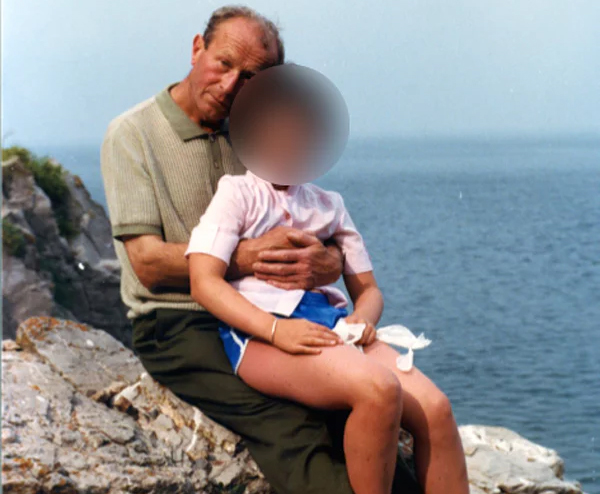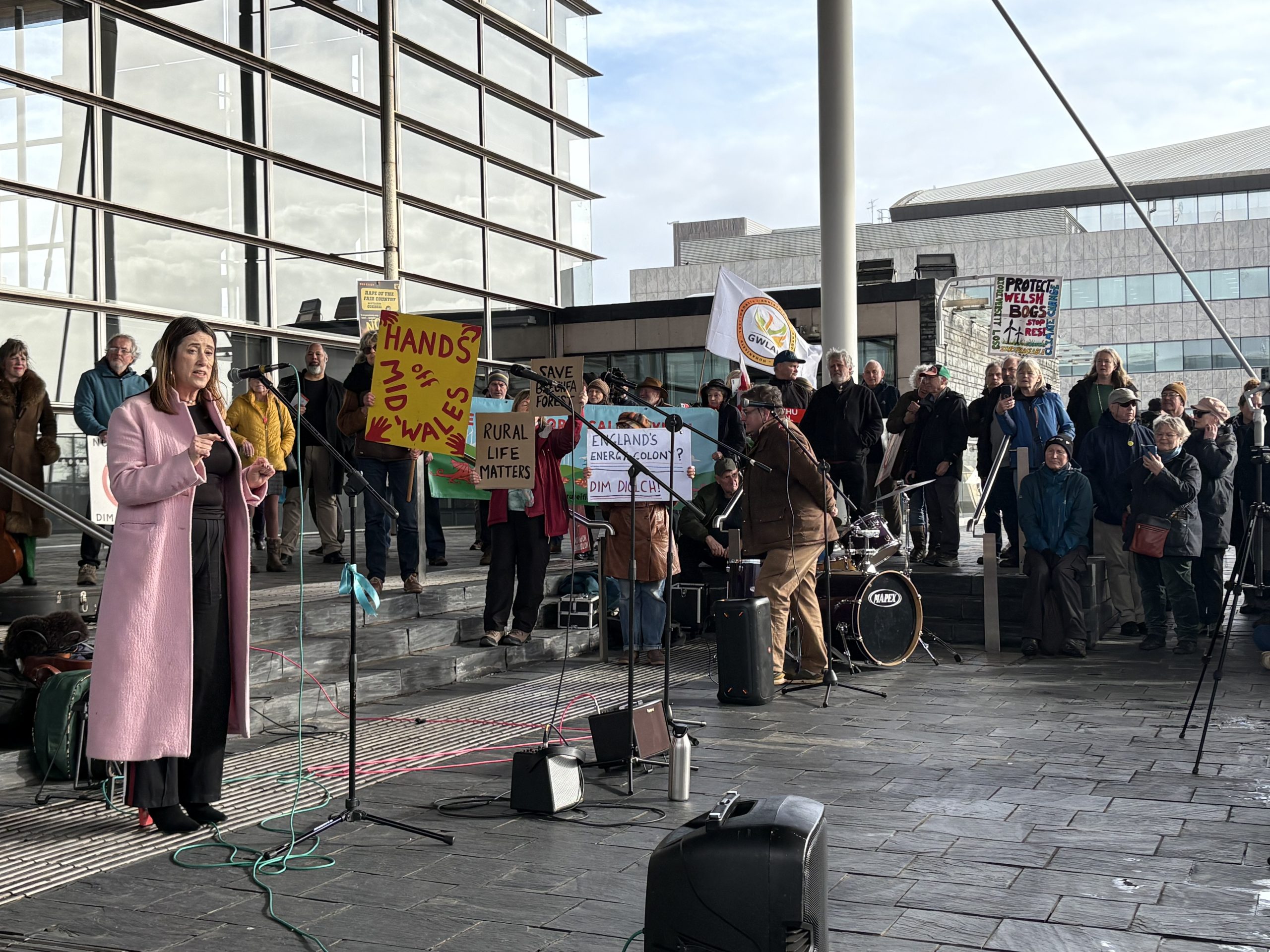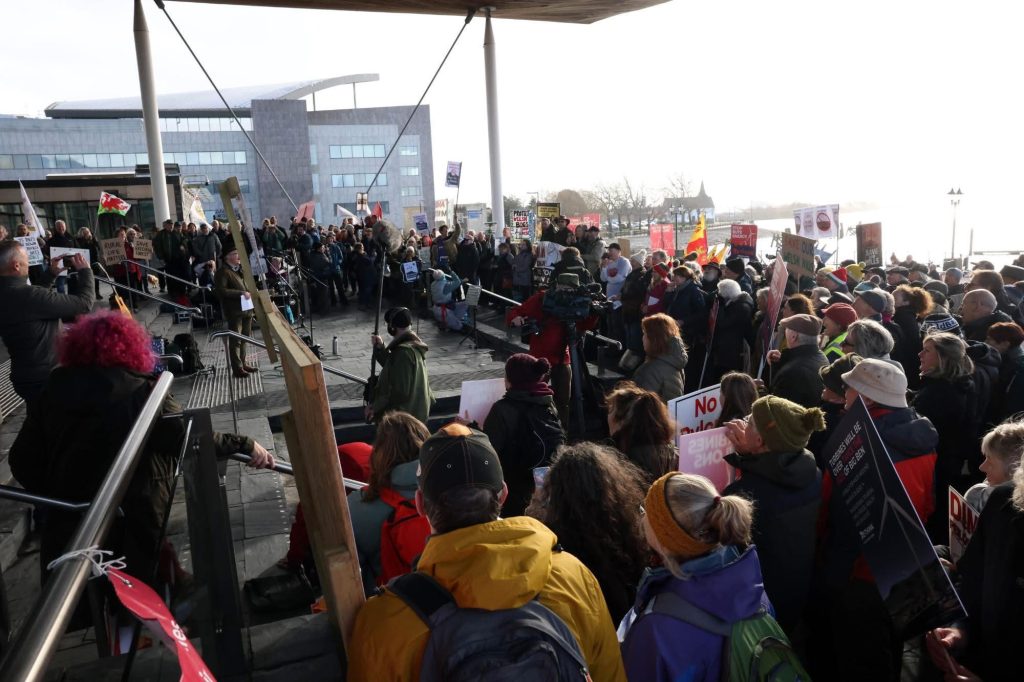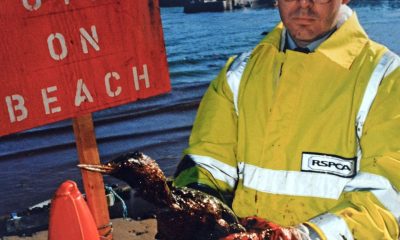News
Extensive historical child sexual abuse and institutional failings at Caldey Abbey

AN INDEPENDENT REVIEW into historical child sexual abuse at Caldey Abbey, situated on Caldey Island, Pembrokeshire, has uncovered extensive abuse by members of the monastic community and critical institutional failures in safeguarding vulnerable individuals.
The report, led by safeguarding expert Jan Pickles OBE, was commissioned in April 2024 by Father Jan Rossey, the Abbot of Caldey Abbey, to address longstanding allegations and promote transparency and healing within the community.
The comprehensive review examined allegations of child sexual abuse spanning several decades, focusing on the actions of specific monks and the abbey’s responses to these allegations. It incorporated survivor testimonies, historical records, and an evaluation of the abbey’s safeguarding policies and practices.
Key findings

The review highlighted multiple monks involved in child sexual abuse, with significant attention on Father Thaddeus Kotik, who lived at the abbey from 1947 until his death in 1992. Kotik is alleged to have abused numerous children between 1972 and 1987.
The abbey failed to act on abuse allegations, allowing perpetrators to continue unchecked. Safeguarding policies were inadequate, and reports of abuse were ignored or mishandled.
Survivors have endured long-term trauma, worsened by the abbey’s failure to acknowledge their suffering or provide meaningful support.
The report outlined several key recommendations:
- Public Apology: Acknowledge the abuse and institutional failures.
- Support for Survivors: Establish accessible counseling services and avenues for redress.
- Policy Reforms: Implement robust safeguarding policies, ensuring all staff are trained to report abuse.
- Collaboration with Authorities: Establish clear protocols for reporting allegations to law enforcement and child protection agencies.
- Ongoing Monitoring: Engage independent bodies to review safeguarding practices regularly.
- Carl Harris, Assistant Director at NSPCC Cymru, said: “It is deeply troubling to read that child sexual abuse occurred ‘in plain sight’ on Caldey Island and the voices of children were not heard.
“This independent review identifies clear missed opportunities to prevent further abuse and bring Kotik to justice.
“It is particularly distressing to hear that children were not listened to and supported when they spoke up to raise concerns, and no action was taken.
“The report further highlights the importance of The Independent Inquiry into Child Sexual Abuse’s (IICSA) recommendation on the need for religious organisations to have robust safeguarding processes in place.
“Child sexual abuse can have a devastating effect on victims, which is why it is so important that survivors can be confident that if they speak out they will be listened to and supported.
“We can all look out for children’s welfare, and anyone concerned about a child can call the NSPCC Helpline on 0808 800 5000, or email [email protected].”
Response from Caldey Abbey
Father Jan Rossey expressed deep regret for the abbey’s historical failures and committed to implementing all recommendations. He emphasized the abbey’s dedication to creating a safe environment and supporting survivors.
The findings at Caldey Abbey underscore a broader issue of child sexual abuse within religious institutions, emphasizing the need for transparency, accountability, and rigorous safeguarding measures.
The abbey plans to collaborate with survivors, safeguarding experts, and authorities to ensure the effective implementation of the recommendations. Survivors and advocates stress the importance of sustained vigilance to prevent future abuse.
Statement from Abbot Father Jan Rossey

“It is with deep sorrow and regret that I have read in the review of the great suffering of children who were abused by Father Thaddeus Kotik and the culture of secrecy and cover-up that kept this hidden.
Opportunities were missed to stop the abuse of children. It is particularly heartbreaking to hear children spoke up to adults, and no action was taken.
Children and their families were failed when they should have been supported and listened to. The abuses should have been reported to statutory authorities.
On behalf of the monastic community, I sincerely apologise to all those who have been hurt and have suffered because of the abuse of Thaddeus Kotik and past failures to protect children.
It is a matter of great shame that this abuse was allowed to happen.
We are committed to implementing all the recommendations in the review and to ensuring that safeguarding is at the heart of our mission.
We will do all that we can to support those who have been harmed and to ensure that Caldey Island is a safe place for all.”

Safeguarding overhaul: Caldey implements comprehensive reforms
CALDEY ISLAND has undertaken a major overhaul of its safeguarding protocols and governance structures under the leadership of Father Jan Rossey. Initially appointed as acting Abbot in January 2023, Father Jan was confirmed in the role in April 2024 and has since spearheaded a series of reforms to enhance the safety and well-being of residents and visitors to the island.
Leadership and governance
One of the key developments has been a reshaping of the abbey’s leadership framework. In June 2023, Caldey appointed a new Island Manager alongside a volunteer Safeguarding Lead to focus on ensuring the highest standards of safety. By July 2023, a revised Board of Directors and Trustees was established, including lay members with legal and financial expertise. Safeguarding now features as a standing agenda item in the Board’s bi-monthly meetings, ensuring it remains a priority.
Further governance changes have made the Island Manager directly accountable to the Board, supported by newly agreed Terms of Reference and other governance structures.
Strengthening safeguarding practices
Caldey Abbey has conducted a thorough review of its safeguarding files, completed in December 2023, and commissioned an external review into historical abuse allegations. Initially launched in March 2024, this review was expanded in June 2024 to include all allegations, both historical and recent.
Training and enhanced policies
Ahead of the 2024 tourist season, the abbey provided safeguarding training to all monks, employees, volunteers, and islanders to bolster awareness and improve reporting mechanisms. Disclosure and Barring Service (DBS) checks were also expanded to include all individuals working or residing on the island. The monastic community underwent DBS checks as early as January 2023.
New policies have been introduced to address safeguarding concerns comprehensively. These include a code titled Caring Safely for Others, which monks must read and agree to, and updated processes for tenant and visiting priest applications that require rigorous vetting.
In collaboration with local authorities, the abbey has also adopted missing child forms and emergency planning measures. Safeguarding posters and dedicated reporting channels via phone and email have been implemented, making it easier for concerns to be raised.
Expertise and collaboration
A key milestone in 2024 was the appointment of a part-time Professional Safeguarding Lead, a qualified social worker, to oversee the abbey’s safeguarding practices. Additionally, a Safeguarding Subcommittee comprising independent professionals in health, education, and human resources now provides oversight.
The introduction of a GDPR-compliant system, My Concern, has further enhanced the secure storage and analysis of safeguarding concerns.
Caldey Abbey has also strengthened its partnerships with Pembrokeshire County Council and Dyfed-Powys Police, ensuring appropriate safeguarding referrals are made when necessary. The abbey benefits from guidance provided by Religious Life Safeguarding Services (RLSS) and is preparing for an audit by the Catholic Safeguarding Standards Agency (CSSA) in 2025.
A safer future
Looking ahead, Caldey Abbey has advertised for a permanent part-time Safeguarding Lead and continues to expand its safeguarding culture. These reforms are part of a wider commitment to transparency, accountability, and the protection of vulnerable individuals.
The Herald says: The publication of this report is a significant step toward justice and healing for the victims. It serves as a poignant reminder of the critical importance of safeguarding vulnerable individuals in all communities. The measures now in place mark a significant step forward for Caldey Abbey, signaling a new chapter that prioritizes the safety and well-being of all who live on or visit the island.
Charity
Christmas jumper day fundraiser helps support lifesaving volunteer service

A WEST WALES charity that delivers blood, medication and urgent medical supplies for the NHS has received a welcome funding boost thanks to the generosity of local driving examiners and instructors.
Blood Bikes Wales has thanked the West Wales Driving Examiners for raising money through a festive Christmas Jumper Day, with additional contributions from Approved Driving Instructors and staff from the Driver and Vehicle Standards Agency.
The fundraising effort has resulted in a sizeable donation that the charity says will go directly towards keeping its volunteer-run service on the road.
Blood Bikes Wales provides a free out-of-hours courier service for the NHS, transporting blood, samples, donor breast milk, medication and other urgent items between hospitals and healthcare sites. The service helps reduce costs for the health service while ensuring patients receive time-critical treatment as quickly as possible.
Mark, the charity’s West Area Representative, accepted the cheque on behalf of the organisation at a small presentation outside the local driving test centre.
A spokesperson for Blood Bikes Wales said the support would “go a long way in helping us continue supporting NHS services and patients across the region”.
They added: “We’re truly grateful for the generosity and community spirit shown by the West Wales Driving Examiners, local ADIs and DVSA staff. Every donation helps keep our bikes fuelled, maintained and ready to respond when the NHS calls.”
The group added a light-hearted note about the day, joking that while there may not have been an official “pass mark” for festive knitwear, the examiners would certainly have earned top marks.
Blood Bikes Wales is powered entirely by volunteers, who give up their time to carry out thousands of deliveries each year, often late at night and in poor weather conditions.
Anyone interested in supporting the charity, either through donations or volunteering, can find more information on the Blood Bikes Wales website.
News
Protest at Senedd as climate groups clash on how Wales should go green

Campaigners demand landscape protection and underground cables while environmentalists warn Wales cannot slow the clean energy transition
A PROTEST took place outside Senedd Cymru on Wednesday (Feb 11) as campaigners gathered to oppose large-scale wind farms, energy parks and new overhead pylons across rural Wales.
Residents from mid and west Wales, including farming families, countryside groups and community activists, assembled on the steps of the Welsh Parliament holding banners reading “Hands off Mid Wales”, “Rural life matters” and “Protect Welsh bogs”.

Many said they support renewable energy in principle but fear that current proposals would industrialise rural landscapes while delivering little benefit to local people.
Among those addressing the crowd was Jane Dodds, leader of the Welsh Liberal Democrats, who renewed calls for ministers to require electricity cables to be placed underground rather than carried on new lines of pylons.

Calls for underground cables
Dodds said Wales must not lose its countryside in the rush to decarbonise.
“We cannot afford to lose our countryside,” she told protesters. “Once these wind turbines and pylons are in place, the impact on our landscapes will be long lasting and, in many cases, irreversible.
“Local people feel their concerns are being overlooked while large developers push ahead with major projects. That is not how the transition to green energy should work.”
She pointed to a recent budget agreement which secured £1 million for a Visual Impact Innovation Fund to trial undergrounding technologies and explore alternatives to overhead infrastructure in sensitive areas.
“We need a balanced approach,” she said. “We must move away from fossil fuels, but we must also protect the beauty and character of rural Wales.”
Why people are protesting
Speakers and attendees raised concerns about:
• visual impact of turbines and pylons on open countryside
• effects on peatland, wildlife and habitats
• loss of productive farmland
• heavy construction traffic through small villages
• profits flowing to distant shareholders rather than host communities
Several campaigners argued that decisions feel “done to” communities rather than shaped with them, with limited consultation and little long-term return.
Some called for smaller-scale, locally owned schemes instead of what they described as “mega-projects”.
Climate groups defend renewables
In response to the protest, Climate Cymru said Wales must not step back from wind power and other renewables, warning that continued reliance on fossil fuels would worsen both the climate and cost-of-living crises.
Stan Townsend, spokesperson for the group, said: “Rising energy bills and energy insecurity are already affecting families, farmers and businesses across the country.
“Turning away from renewables would mean deeper dependence on volatile, expensive, polluting fossil fuels. We need clean, home-grown energy to protect people and the planet.”
He said Wales has some of the best wind resources in Europe and a major opportunity to cut bills, create skilled jobs and strengthen energy security.
Community ownership ‘key to support’
Community Energy Wales said many objections could be eased if local people had ownership or a financial stake in developments.
Leanne Wood, co-executive director, said: “If communities can part own developments, many of the objections to new wind turbines can be overcome. Ownership brings control.
“This would lock the profits into those communities and potentially reduce bills.”
The organisation is working to enable locally generated renewable electricity to be sold directly to local consumers so that wealth stays within towns and villages.
A wider debate
The demonstration highlights a growing divide over how Wales meets its net zero targets.
While environmental groups stress the urgent need to expand renewable energy quickly, rural campaigners say the Wales-wide push must not come at the expense of landscapes, farming and community consent.
Dodds urged the Welsh Government to strengthen planning, consultation and benefit schemes so that communities see clear advantages.
For many at the Senedd, the message was clear: renewable energy is necessary — but only if local people share the control, the profits and the decisions.
News
West Wales Together Alliance launch in Haverfordwest

A NEW alliance bringing together community groups, trade unions, faith leaders and campaigners from across west Wales is set to launch in Haverfordwest next month.
The West Wales branch of the Together Alliance will officially begin with a public meeting at 7:00pm on Wednesday (Feb 18) at Haverfordwest Mosque, Cherry Grove.
Organisers say the event will unite local politicians, farmers, artists, anti-racist organisations and faith groups in response to what they describe as growing “voices of division” in national and local politics.
In a statement, the alliance said: “Those who preach division are becoming more confident. Their false promises seize on very real economic problems and scapegoat migrants, Muslims and refugees.
“But we can change things together. The voices of unity can grow stronger. Strength lies in solidarity and working together for hope, not despair.”
The group aims to build cooperation between communities and challenge racism and extremism through grassroots organising. It says hundreds of organisations and individuals nationwide have already signed up.
The Haverfordwest launch forms part of a wider mobilisation ahead of a major national demonstration planned for London on March 28.
Several high-profile supporters have also backed the campaign, including comedian and campaigner Lenny Henry, who said: “We stand for love over hate, hope over fear and unity over division. We’re coming together against racism.”
Singer Paloma Faith added: “There is no world that I want to live in where discrimination is acceptable for anything.”
Organisers say anyone interested in promoting inclusion, equality and community solidarity is welcome to attend.

-

 Health6 days ago
Health6 days agoHealth board targets rise in steroid and gym drug use across west Wales
-

 Crime6 days ago
Crime6 days agoTeacher injured and teenager arrested for attempted murder at Milford Haven School
-

 Business2 days ago
Business2 days agoComputer Solutions Wales under fire from customers
-

 Health9 hours ago
Health9 hours agoHealth Board to decide future of nine key services at two-day meeting
-

 Business5 days ago
Business5 days agoSix-figure negligence victory leaves retired builder trapped in divorce limbo
-

 Sport6 days ago
Sport6 days agoWales name squad for Six Nations opener against England
-

 News6 days ago
News6 days agoReform appoints Dan Thomas to lead party in Wales
-

 News6 days ago
News6 days agoAnother Senedd member defects to Reform as Lib Dem MP hits out





































